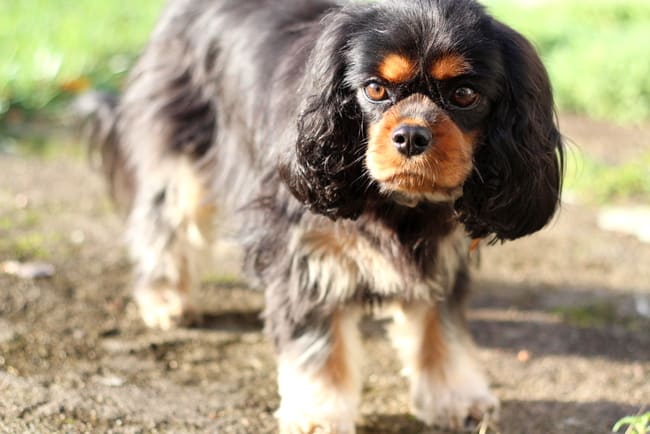Tom and I enjoy walking Dagny together on the weekends, and with a few extra vacation days lately due to the holidays, we found ourselves doing even more walking than usual. A topic of conversation that always comes up on walks? The French language. I ask a few questions, Tom gives a few examples and sometimes reviews a few things in English as well. It’s always a learning experience.
What did I learn the other day? How not to say your dog is a pervert (after telling someone their dog was, thankfully, not a pervert). Not exactly what I was trying to say. So yeahhhhhhhhhh, not my finest moment.
Learn from my mistakes… GO!
French lessons with Tom while walking the dog
I’m at the point where I speak French reasonably naturally and spontaneously, but I’m not immune to ridiculous flubs here and there! Even though making mistakes is how you learn, sometimes you make mistakes and no one corrects you so you have no way of knowing about your faute. The story I’m telling you today is one such mistake — that I’d probably made 10+ times except Tom was never with me when I said it, so I had no idea. Until the other day when we were out walking Dagny together and I said it.
Dangers of pine processionary caterpillars in France and beyond >>
So here we were walking along through the park when a barking dog comes out from behind a tree on the left. I was looking down at something I found in my pocket and didn’t see him coming and the barking startled me. I jumped and said “Ahhhhh” and realized it was just a small leashed dog and no big deal (not like the big unleashed ones we see from time to time that have charged us, so yes I’m a little jumpy).
As our new furry friend approached us and said hi to Dagny, I wanted to say, “Oh, you’re not a mean dog after all.” Yeah, sometimes I talk to dogs. What I should have said in French was, “Ohh tu n’es pas un chien méchant.” He was a perfectly sweet dog that started off barking but was totally nice.
But what did I say?
Something I’ve said many times on walks with Dagny alone when we encounter seemingly mean dogs that turn out to be fine. I turned to the sweet dog and said, “Ohhh tu n’es pas un chien vicieux.” (Ohhh, you’re not a vicous dog!) DOH!
Tom kindly pointed out afterward that I messed up.
In this sense, vicieux does NOT mean vicious.
In French, vicieux means perverted. Or lecherous.
So what I said was, “Oh, you’re not a perverted dog.” Not what I was going for! Easy mistake to make though. In English we’d characterize a dog as vicious or use vicious in reference to an attack so I figured the word had the same meaning. Never assume! Ooops.
If you want to say something about a person or dog being vicious, just say méchant which translates to mean but works just fine in this case. Got it?








Nice to have an expert able to explain nuance and idiom!
Yes, wish I could walk with Tom every day. Always learning new things!
I love your mistakes! Thanks for sharing them with us so we can learn from them, too.
You’re very welcome!
Oh no what a mistake, but a great tale to tell
At least I didn’t know it was a mistake in the moment. Sometimes those are worse when you know you just said something ridiculous. I got to hang my head in shame in privacy.
Uh oh – I’ve may have been telling people Saari isn’t perverted although thankfully not too often as I have trouble pronouncing vicieux. Oh the pitfalls of learning another language so thanks for the heads up on this one! A great post to add to #AnimalTales 🙂
Yes, it’s a very easy mistake to make!
Lovely to revisit this post and thank you for adding it to the 100th #AnimalTales
at least you didn’t make the mistake of saying it to an adult rather than referring to a dog. It’s the English language I struggle with living in South Africa and now Dubai, as a lot of it is America English and I can have problems making myself understood to people who speak English as a 2nd language
Yes, thank goodness I was just referring to a dog and not making a joke about a person and having it come out wrong! Curious about what you said about non-natives and their comprehension — do you feel the trouble is from the South African pronunciation of words they know (them just not recognizing a word they usually hear pronounced differently) or the vocabulary differences? Like loo instead of bathroom or lift instead of elevator?
Well, those are some mistakes that many people make, and not only is it in French but with almost ever other language. Wish every learner had a Tom to walk along with 🙂 Thanks a lot for the share.
Cindy
That’s an easily mistake to make. Those ‘false friends’ in language can catch you out.
Ha ha Diane this made me laugh. Not having a dog I don’t think I’ve ever tried to use the word vicious so I don’t think I’ve made this mistake but I know I’ve made plenty of equally inappropriate ones in my time. #AnimalTales
Ha! Also if you want to say your dog ‘feels hot’ because of a heat wave of some sort… say ‘he HAS hot’ and NOT ‘he is hot’ – “il a chaud” is the correct sentence. 🙂 Otherwise… he will also be mistaken for a “chien vicieux” 😛
Mine was even more embarrassing. As a student in France I lived with a family that had a dog. I knew the word “un baiser” meant a kiss. So I extrapolated that “baiser” meant to kiss Wrong! Therefore, when I told my French friends that, before I left for the day, “le chiem m’a baisé”, they fell on the floor laughing.